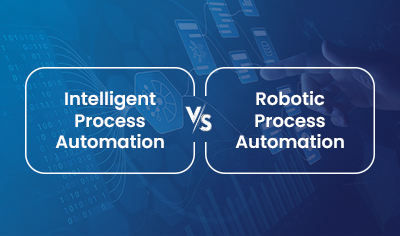The key to staying ahead of the competition is embracing emerging technologies that help companies drive workforce productivity, streamline workflows, and enhance customer satisfaction. RPA (Robotic Process Automation) is one such emerging technology that offers limitless business value to any department, however, its benefits extend even beyond in the HR vertical owing to the high volume of manual, time-intensive, and administrative tasks that are repetitive in nature.
According to a report by Deloitte, over 50% of standard HR operations can be automated with RPA. In fact, implementing Robotic Process Automation in HR processes reduces the employee onboarding time by 90%. Besides cutting down on employee onboarding time, RPA in HR reduces error rates to almost zero by automating a slew of tasks that require manual and repetitive labor. These tasks include CV screening and shortlisting candidates, employee induction and training, payroll processing, employee data management, expense management, performance management, employee exit management, and many more. Unlike traditional HR tools that only help in data management, RPA integrates well with most of the HR functions and meets desired objectives efficiently. Now, let’s find out how RPA helps HR professionals.
What Business Processes to Automate with Robotic Process Automation
Benefits of RPA in Human Resources
Implementing RPA in HR processes significantly improves the efficiency of HR staff by automating most of the repetitive tasks. This non-invasive technology is easily integrated with an existing enterprise IT landscape and performs manual drudgery in the background with little to no human intervention.
1. Lower Attrition Rate
RPA in HR contributes to lowering attrition rates since the implementation of bots automate repetitive and rule-based tasks, allowing HR professionals to focus on more strategic and value-added activities such as addressing employees’ concerns. For instance, RPA in HR operations streamlines the onboarding process by automating repetitive tasks whilst offering an efficient and smooth onboarding experience, which in turn, reduces the likelihood of dissatisfaction and frustration that contribute to early attrition. Similarly, Robotic Process Automation in HR automates various aspects of the performance management process including tracking progress against objectives, setting reminders for performance reviews, etc. This ensures timely feedback which positively impacts job satisfaction and lower retention among employees.
2. Improved Productivity
Since RPA-powered bots will be performing manual and repetitive tasks in the background, HR professionals focus on more high-value tasks resulting in improved productivity. For instance, RPA bots streamline onboarding processes, automate time and attendance tracking, and ensure compliance with HR policies and regulations, allowing HR staff to focus on more strategic aspects of workforce management rather than investing time and effort in routine administrative tasks.
3. Greater Efficiency
Robotic Process Automation (RPA) in HR significantly improves efficiency by streamlining workflows, automating routine tasks, and reducing manual errors. For instance, RPA bots are leveraged to automate data entry tasks, such as verifying information, updating employee records, and maintaining databases. This not only eliminates the risk of errors but also improves accuracy and overall efficiency in HR operations. Similarly, RPA assists HR staff in reducing the time and effort required for routine administrative tasks, resulting in more efficient onboarding and offboarding.
Use Cases of RPA in Human Resources
HR professionals are replete with a multitude of administrative tasks that are repetitive and time-consuming in nature and require intense manual labor. Let’s dive deep into the popular use cases of RPA in HR.
I. Candidate CV Screening and Shortlisting
When it comes to filling open positions in a company, HR professionals have to go through the huge piles of candidates’ resumes and applications received through multiple channels such as LinkedIn, job portals, emails (direct references), etc. Screening candidates manually is a tedious and time-intensive task. With RPA implementation, HR specialists are able to expedite the process of CV screening and candidate shortlisting.
By deploying Robotic Process Automation in HR, digital workers (intelligent bots) will meticulously perform background checks and shortlist the candidates by analyzing and comparing their qualifications, work experience, and other indispensable information against the job requirements. Based on this, the shortlisted candidates will receive interview notification calls in a matter of seconds. Besides this, RPA helps human resources professionals do away with the mountains of paperwork involved in the hiring process. Simply put, RPA in HR not only streamlines the complicated recruitment process but also helps in attracting top talent.
II. Creating and Issuing Offer Letter
Robotic Process Automation in HR is also helpful in creating and issuing offer letters to new joiners. The content present in an offer letter is highly personalized to the candidate and 100% accurate whilst conforming to local and company regulations.
Explore Automation Expedition with RPA Use Cases
III. Streamline Onboarding
Each new employee brings a new skill set. However, the process of onboarding is almost similar for every employee. If a company is hiring in mass numbers, the joining formalities and other paperwork consumes a lot of time for HR professionals. With Robotic Process Automation in HR, the entire onboarding process is streamlined with 100% accuracy and 10x less processing time. Upon the creation of a new employee account, digital workers (RPA bots) will automatically trigger a template for the onboarding workflow. Besides this, intelligent bots are also leveraged for the creation of employee IDs. This in turn helps new joinees to quickly get into their job role and responsibilities in a hassle-free manner.
IV. Payroll Processing
Amidst all tasks performed by human resources specialists, payroll is the most tedious and repetitive since it requires massive manual labor such as data entry on a regular basis. In fact, managing payroll manually increases the risk of errors in operations. Furthermore, ever-changing tax slabs make payroll processing more laborious and time-intensive for HR professionals. By deploying RPA-driven bots, HR specialists can significantly improve payroll process-related accuracy, consistency, and service quality. Simply put, automating the payroll process will not only reduce the inaccuracy rate but also help HR specialists ensure that employees are paid on time, which in turn, keeps employees happy.
Best Practices for RPA Implementation into the HR System
Integrating RPA into the HR system brings a multitude of benefits. However, successful implementation requires careful planning and implementation. To navigate this process smoothly, here are some best practices for implementing RPA in HR operations.
I. Start Small
Begin by automating one or two simple HR tasks. This helps in determining how RPA works and allows personnel to fix any issues before expanding to more complex processes.
II. Choose the Right Processes
Select HR tasks that are repetitive and time-consuming for automation. Look for processes that have clear steps and consistent data input, as these are easier to automate successfully.
III. Optimize Existing Workflows
Before implementing RPA, review and improve the current HR processes. Make sure they are efficient and easy to understand, which will make automation smoother.
IV. Involve HR Staff
Get input from HR team members who will be using the RPA tools. Their feedback helps identify potential problems and ensure the new system meets their needs.
V. Develop a Clear Plan
Create a detailed plan for RPA implementation into the HR system. This should include timelines, goals, and who will be responsible for each step.
VI. Train the Team
Provide training for HR staff on how to use the RPA tools. This helps them make the most of the emerging technology.
VII. Monitor Performance
After implementing RPA, regularly check how well it is working. Look at metrics like speed, accuracy, and user satisfaction to see if improvements are needed.
VIII. Maintain Compliance
Ensure that RPA processes follow all relevant laws and regulations in HR. This helps protect the organization from legal issues.
IX. Communicate Changes
Keep everyone informed about what changes are happening with RPA implementation in HR. Clear communication helps reduce confusion and resistance among staff.
X. Plan for Future Growth
As the staff becomes more comfortable with RPA, think about how to expand its applications in HR. Identify other tasks that might benefit from robotic process automation.
Summing Up
Businesses are investing heavily in RPA implementation since it has the potential to liberate HR professionals from monotonous, time-intensive, and repetitive tasks. The scope of RPA in HR is not just limited to shortlisting candidates, employee onboarding, and payroll processing. In fact, Robotic Process Automation in HR is also helpful in employee induction and training, data management, expense management, performance management, tracking attendance, employee exit management, and more. If you are planning to embrace Robotic Process Automation in HR, consider seeking end-to-end consultation from a reliable RPA expert.







